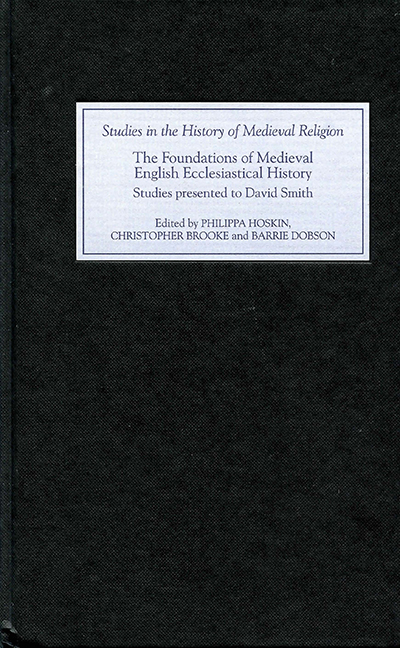Book contents
- Frontmatter
- Contents
- List of Contributors
- Acknowledgements
- Abbreviations
- Miscellaneous Frontmatter
- David Smith: the Scholar
- ‘The archivist is not and ought not to be a historian.’ David Smith and the Borthwick Institute
- Why Forge Episcopal Acta? Preliminary Observations on the Forged Charters in the English Episcopal Acta Series
- Pastors and Masters: the Beneficed Clergy of North-East Lincolnshire, 1290–1340
- The Convent and the Community: Cause Papers as a Source for Monastic History
- Patriarchy and Patrimony: Investing in the Medieval College
- ‘Above all these Charity’: the Career of Walter Suffield, Bishop of Norwich, 1244–57
- The Law of Charity and the English Ecclesiastical Courts
- Continuing Service: the Episcopal Households of Thirteenth-Century Durham
- The Acta of English Rural Deans in the later Twelfth and early Thirteenth Centuries
- The Court of Arches and the Bishop of Salisbury
- Bishops’ Registers and Political History: a Neglected Resource
- The Vatican Archives, the Papal Registers and Great Britain and Ireland: the Foundations of Historical Research
- Bibliography of the Writings of David Smith
- Index
- Tabula Gratulatoria
The Acta of English Rural Deans in the later Twelfth and early Thirteenth Centuries
Published online by Cambridge University Press: 24 October 2017
- Frontmatter
- Contents
- List of Contributors
- Acknowledgements
- Abbreviations
- Miscellaneous Frontmatter
- David Smith: the Scholar
- ‘The archivist is not and ought not to be a historian.’ David Smith and the Borthwick Institute
- Why Forge Episcopal Acta? Preliminary Observations on the Forged Charters in the English Episcopal Acta Series
- Pastors and Masters: the Beneficed Clergy of North-East Lincolnshire, 1290–1340
- The Convent and the Community: Cause Papers as a Source for Monastic History
- Patriarchy and Patrimony: Investing in the Medieval College
- ‘Above all these Charity’: the Career of Walter Suffield, Bishop of Norwich, 1244–57
- The Law of Charity and the English Ecclesiastical Courts
- Continuing Service: the Episcopal Households of Thirteenth-Century Durham
- The Acta of English Rural Deans in the later Twelfth and early Thirteenth Centuries
- The Court of Arches and the Bishop of Salisbury
- Bishops’ Registers and Political History: a Neglected Resource
- The Vatican Archives, the Papal Registers and Great Britain and Ireland: the Foundations of Historical Research
- Bibliography of the Writings of David Smith
- Index
- Tabula Gratulatoria
Summary
This article brings together for the first time a substantial selection of the earliest known acta and charters of English rural deans, from the mid twelfth century to c.1220. The aim is to illustrate from documents issued by them some aspects of their role in English diocesan administration and jurisdiction at this early and important stage of their existence. Of the twenty-two texts included here, most survive as more or less full copies, but four are originals. The small number of ruridecanal letters surviving from this period, some quite lengthy, have been omitted for reasons of space, as have the few acta issued by deans in conjunction with others, such as when acting as papal judges-delegate, but the total of individual acta so far discovered is still pitifully small, considering the hundreds of deans who operated in England at this time. The rural deans of the later twelfth and early thirteenth centuries are mostly shadowy figures about whom, as individuals, we know next to nothing. It is not that we hear little of rural deans, or do not know their names – quite the reverse, for they occur frequently in the charters and other legal documents of the period. Most commonly they appear as witnesses to gifts (particularly to monasteries), settlements and the like, but deans are also fairly often referred to in other people's charters as playing some part in the legal processes recorded therein. A major limitation of the surviving evidence, however, is its almost total silence on the inquisitorial and corrective powers of the rural deans. Among the acta printed below the only such case is the precious reference to the rural dean of Pirehill (or Stafford) exacting a penalty of ten shillings from a wife convicted of adultery, presumably in his rural chapter (no. 11). Other types of record show rural deans carrying out a variety of legal and administrative duties, but the extreme rarity of such references in their acta is due to the fact that the overwhelming bulk of the evidence surviving from this early period concerns the rights of individuals or monasteries to possess lands, churches and the like, since it was generally only documents which fortified those rights that were preserved.
- Type
- Chapter
- Information
- The Foundations of Medieval English Ecclesiastical HistoryStudies Presented to David Smith, pp. 139 - 158Publisher: Boydell & BrewerPrint publication year: 2005

